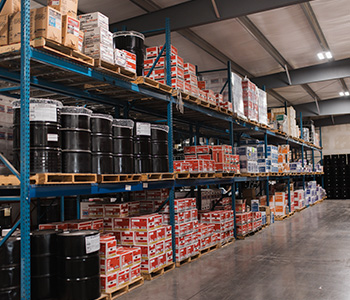Farmers Cooperative and United Coolants
Jun 11, 2025

Written by Brian Irwin, Lubricants Manager
Forty percent of all engine failures can be linked to issues within the cooling system.
A typical antifreeze/coolant formulation is 96% water and glycol. The remaining 4% are the additives that play an important role in the health of your engine. In heavy-duty diesel engine applications, coolant/antifreeze is formulated to prevent cavitation and liner pitting in wet sleeve liners and protect against scale, corrosion and hard water deposits. Wet sleeve cylinder replacement is considered one of the most costly cooling system repairs.

Cavitation occurs in wet sleeve liners from rapid formation and collapse of vapor bubbles caused by vibrations as the piston moves up and down. The collapsing bubbles cause a “hammering” effect that damage the liner and cause small holes to appear. These small holes eventually penetrate through the liner wall and allow Oil & Coolants to mix.
Coolant additives, referred to as inhibitors, prevent this from occurring. They form a hard surface on the liner wall that shields the metal from the effects of the vapor bubble implosion and subsequent pitting.
There are two general categories of inhibitors: inorganic and organic.
Organic acid technology (OAT) inhibitors are preferred by most of today’s OEMs and eliminate the need to add SCAs (supplemental Coolant Additives) which are sacrificial, and coolant filters to replenish the antifreeze/coolants effectiveness. OAT inhibitors move to trouble spots as needed and selectively protect the cooling system. They last much longer than inorganic inhibitors and can be used up to a million miles, 20,000 hours, or eight years.
Another similar technology, Nitrite Organic Acid Technology (NOAT), contains an organic inhibitor plus nitrite and offers a level of redundant wet sleeve liner protection. The nitrate level must be monitored routinely because it can deplete more rapidly, especially in systems with aluminum radiators. This typically requires an SCA when levels drop. Also, it typically requires an SCA extender at 500,000 miles.
“take the guess work out of coolants and inventory, simplify with OAT (Organic Acid Technology)”.
Call Farmers Cooperative today at (402) 798-2170 and we can help get you with all your coolant, lubricants, grease and DEF needs.
Forty percent of all engine failures can be linked to issues within the cooling system.
A typical antifreeze/coolant formulation is 96% water and glycol. The remaining 4% are the additives that play an important role in the health of your engine. In heavy-duty diesel engine applications, coolant/antifreeze is formulated to prevent cavitation and liner pitting in wet sleeve liners and protect against scale, corrosion and hard water deposits. Wet sleeve cylinder replacement is considered one of the most costly cooling system repairs.
Cavitation occurs in wet sleeve liners from rapid formation and collapse of vapor bubbles caused by vibrations as the piston moves up and down. The collapsing bubbles cause a “hammering” effect that damage the liner and cause small holes to appear. These small holes eventually penetrate through the liner wall and allow Oil & Coolants to mix.
Coolant additives, referred to as inhibitors, prevent this from occurring. They form a hard surface on the liner wall that shields the metal from the effects of the vapor bubble implosion and subsequent pitting.
There are two general categories of inhibitors: inorganic and organic.
Organic acid technology (OAT) inhibitors are preferred by most of today’s OEMs and eliminate the need to add SCAs (supplemental Coolant Additives) which are sacrificial, and coolant filters to replenish the antifreeze/coolants effectiveness. OAT inhibitors move to trouble spots as needed and selectively protect the cooling system. They last much longer than inorganic inhibitors and can be used up to a million miles, 20,000 hours, or eight years.
Another similar technology, Nitrite Organic Acid Technology (NOAT), contains an organic inhibitor plus nitrite and offers a level of redundant wet sleeve liner protection. The nitrate level must be monitored routinely because it can deplete more rapidly, especially in systems with aluminum radiators. This typically requires an SCA when levels drop. Also, it typically requires an SCA extender at 500,000 miles.
“take the guess work out of coolants and inventory, simplify with OAT (Organic Acid Technology)”.
Call Farmers Cooperative today at (402) 798-2170 and we can help get you with all your coolant, lubricants, grease and DEF needs.